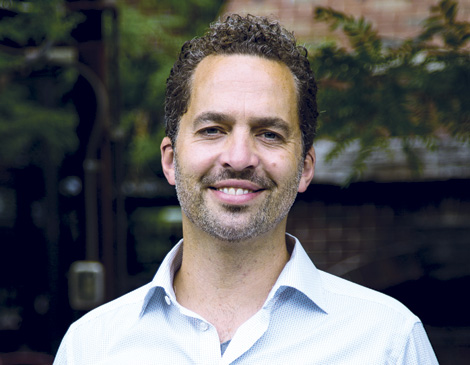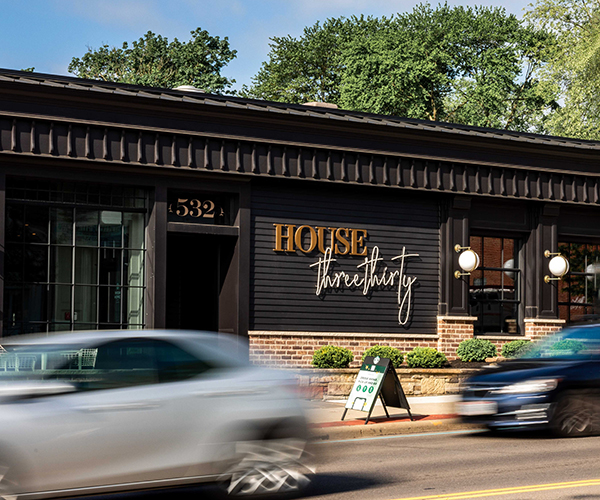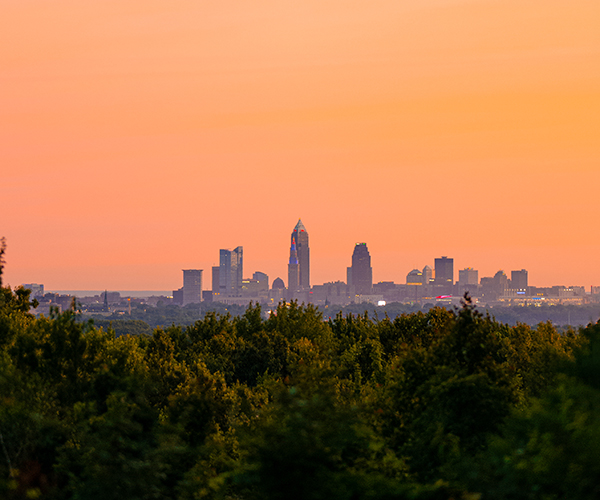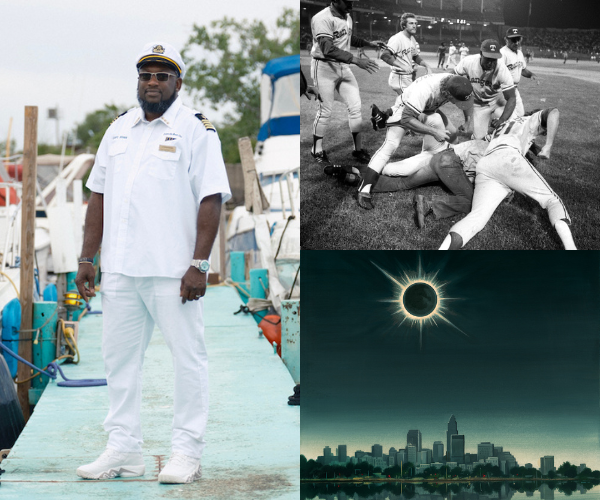Sam McNulty stands atop Market Garden Brewery & Distillery exuding his usual, happy-go-lucky cool. The harsh July sun and heat from his bar's blacktop roof don't appear to faze him. He seems comfortable even, except for one small problem. "I wish I would have brought my beer up here," he says with a parched smile.
A warm blast of barley vapor billows out of a nearby vent and drifts upward, rising toward the West Side Market's clock tower. It's a reminder of the half-full pint of hefeweizen that McNulty left behind downstairs. The white, aromatic cloud also signals that brewmaster Andy Tveekrem is hard at work keeping up with demand for Market Garden Brewery's dozen beers. It's been particularly high since McNulty's gift to the beer gods and Cleveland brewpub junkies alike opened its doors at the end of June.
"We started running out of beers left and right," McNulty recalls of his Ohio City spot's earliest days. Dinner wait times for a table topped two hours, even in a space that holds 320 patrons between its 9,000-square-foot interior and 3,000-square-foot beer garden.
But to understand the excitement surrounding Market Garden Brewery, one first needs to realize what the 37-year-old McNulty has already done in the neighborhood during the past six years. In 2005, he unveiled his popular Belgian beer destination, McNulty's Bier Markt, before teaming with chef Jonathon Sawyer two years later to create the adjoining Bar Cento (Sawyer left in 2008 to focus full time on The Greenhouse Tavern).
Then, in 2009, McNulty quietly opened a cocktail bar beneath Bier Markt called Speakeasy. In keeping with the Prohibition-era vibe, there are no signs, just a chandelier over a stairway. If it's lit, Speakeasy is serving. Downstairs you'll find a long bar and high-octane cocktails crafted from house-infused liquors.
So, when McNulty announced that he was teaming with Tveekrem, who got his start at Great Lakes Brewing Co. before working at Delaware's Dogfish Head Brewery, to open a new brewpub just down the street from the birthplace of Christmas Ale, Cleveland beer lovers weren't just excited; they were intrigued.
Then, in late May, USA Today named Ohio City one of the 10 great places to bar hop around the world, along with Dublin, Brooklyn and New Orleans. In addition to Garage Bar, Great Lakes Brewing Co., McNulty's Bier Markt and Speakeasy, the article singled out Market Garden Brewery. Although it hadn't sold its first beer yet, McNulty's new place was already getting national press.
Part of such fevered hype is because McNulty approaches his work with a nearly religious intensity that gets others excited. Spend an afternoon with him, and you're a convert. Just as he outlines how the rooftop he's showing off today will eventually be a patio that seats 200, he explains his vision for an Ohio City that is known as ground zero for great beer, a place where the smell of barley is wafting from at least two more breweries. He knows this is possible because he's already talked with other beer-makers interested in moving here. It's a big idea, of course, one that still faces plenty of logistical and financial hurdles, but McNulty seems to see only the promise.
"How cool would it be to visit four breweries within blocks of each other?" he asks. "There'd be nothing like it in Northeast Ohio, probably the entire state."
Sam McNulty has been hustling since age 11. Early mornings in the 1980s, the second oldest of his family's seven children would rise at 4:30 a.m. to deliver The Plain Dealer and The New York Times near Coventry Road, not far from his family's Cleveland Heights colonial on Hampshire Road.
On Wednesdays his weekly Sun Press route was added to the day's work. He walked because the load was too heavy for a bike, and often dreamed of traveling the world, maybe even doing missionary work. He knew plenty about working for the greater good already. He handed over most of what he earned to help with the mortgage and buy groceries. McNulty's father earned his living as a state social worker while his mom stayed at home to raise the kids.
"I didn't know I was poor until high school," McNulty says, adding that was when he finally figured out that other kids didn't wear their older sibling's hand-me-downs.
"I never got any birthday presents, but our parents enrolled us in every class they could afford," he adds. "They always encouraged us to learn, to ask questions and encouraged our intellectual curiosity."
So the painfully shy paperboy learned to play the guitar and the piano, paint and even cross-stitch. "We were the weirdest family on the block," he says. "If there was some odd way of doing something, we were doing it."
That included the family's organic diet, which came from either the backyard or was purchased in bulk with other families in a sharing system that ultimately became the Cleveland Food Co-op. The family also made frequent shopping trips to the West Side Market.
The building that today houses Market Garden Brewery's giant, 20-barrel fermenting tanks and a bulbous copper still that will soon be used to make flavored vodkas and whiskeys was once the West Side Market's poultry shop. The faded Japanese characters for "chicken" and "duck" are still visible on Market Garden Brewery's back wall underneath new, large red letters that spell out "BREW HOUSE."
McNulty remembers visiting the poultry shop with his family to select their still-squawking supper before shopping in the market next door. They returned to find their dinner plucked, dressed and still warm. "It doesn't get any fresher than that," he says.
After high school, McNulty pursued urban studies at Cleveland State University. "I wanted to get more involved in rebuilding cities, especially Cleveland," he says. After his freshman year, he took his first trip overseas, a three-month pilgrimage to the family farm in Ireland, where his older brother Paul and his wife were living. He returned in the fall to continue his degree at CSU, but it wasn't long before he was aching for more adventure.
So, the following school year, he studied in Krakow, Poland, soaking in European history and architecture. He also visited Lithuania, the homeland of his mother's parents, and Germany, where his mother was born in a displaced-persons camp during World War II.
He carried only a backpack during his trip and stopped at as many Dusseldorf and Berlin beer gardens as he could. He was impressed by the conviviality of the places, where the locals sang, smiled and talked. "It wasn't just beer," he says. "It was the camaraderie."
Upon his return, McNulty used money he had saved over the years from his paper route and work in real estate rehabilitation to open a Panini's franchise, later renamed Café 101, at CSU. It was the only place on campus with a liquor license, and McNulty says the bar was a success. But in 2004, the university didn't renew his lease in favor of national food service provider Aramark.
McNulty, a CSU graduate student at the time, blasted the university for choosing a large national company over a small local business. "It was a good atmosphere, young and vibrant," he told the Cleveland Stater in 2004. "We don't have that anymore."
Disenchanted with the university, he stopped taking classes and left for India to attend a friend's wedding. He came back five weeks later with the perfect idea for a bar after meeting a fellow traveler who worked at a Belgian beer spot in Australia.
His T-shirt says it all. It's simply the word "BEER" in block letters surrounded by the outline of Ohio. You'll spot McNulty's bartenders at Market Garden Brewery wearing them. You can even buy one for $19 if you'd like to sport your Ohio beer pride.
McNulty's name has been synonymous with beer in Cleveland since he put it on his Belgian beer bar along West 25th Street. McNulty's Bier Markt opened in 2005 with a menu of more than 80 brews ranging from Trappist Monk-made Chimay to fruit-infused lambics. It introduced even well-traveled palates to tasty new acquaintances.
"You get all walks of life, all demographics," McNulty says of why he chose Ohio City for his first bar. "It's a microcosm of all the crazy things we have in Cleveland, all distilled down into a dense, walkable neighborhood."
His devotion to the neighborhood and his businesses is why he says he turned down the chance to host his own Travel Channel show last year. "I would travel to different cities around the world and just explore their bars and bar culture," he says of the premise.
"I wouldn't leave my three babies," McNulty explains, "especially when I had another one on the way."
His Market Garden Brewery is a stunning reincarnation of the old Middle Eastern grocery store that most recently called the space home. It is the result of a $3 million investment and "four founding fathers," as McNulty puts it: himself; his brewer, Andy Tveekrem; Mark Priemer, whom McNulty calls "the brains of the operation;" and Michael Foran, "the ninja of the partnership."
The space is airy with IPA-colored wood walls and floors. It's not trendy. It's not retro. It's just a great place to drink a beer and maybe eat a currywurst — a German-Indian hybrid McNulty first discovered as he suffocated a buzz with some German street food.
He also used his travels in Europe and his architectural acumen to make his outdoor beer garden feel authentic without looking out of place just across an alley from the West Side Market's produce pavilion. He made the indoor dining room a U shape with the beer garden filling in the middle. "The idea is we're almost embracing the market, architecturally, aesthetically and ideologically," he says.
The beer garden's tabletops are made from a century-old poplar tree. When McNulty learned it was going to be cut down to make way for the Cleveland Museum of Art expansion, he bought the wood. "It's having a lot more fun here," he says.
Downstairs, in the climate-controlled spirits room, McNulty sets down a beer sampler that looks like a sepia rainbow served on a paddle and points to the dark brown Cluster Fuggle IPA. "I suggest doing this one last," he says, before clearing up a common beer-tasting misconception. "It's not light to dark. What you really want is less hoppy to more hoppy because once you get hops on your palate, all other beers taste like water."
McNulty pauses for a moment and then clears up any possibility one would find him stuffy or pretentious about his brews.
"Who am I kidding? There's no wrong way to drink beer," he declares before taking a sip. "At least I haven't found one yet."
Across West 25th Street, on the wide, north side of Market Avenue, Pat Conway sits on the patio outside of Great Lakes Brewing Co. with a glass of his brewery's The Wright Pils, a tribute to Ohio-born Orville and Wilbur.
He points to an antique ad painted on his brewpub's facade. It was unearthed during a demolition to create Great Lakes' beer garden. The building was once part of German immigrant Leonard Schlather's brewery and now houses Great Lakes Brewing Co.'s bar and restaurant. The sign reads: "Old Stout, Kennett Ales and Porters in stock. For families and medicinal purposes."
"They had a different attitude about alcohol back in the 1870s," Conway says. Ohio's attitude shifted drastically in 1918, when the Buckeye State became dry two years earlier than the 18th amendment to the Constitution enacted Prohibition.
While some of the city's 30 breweries survived the ban on alcohol (Leisy Brewing Co. even attempted to bottle soft drinks), L. Schlather Brewing Co. and its Ohio City neighbor, C.E. Gehring Brewing Co., went out of business. Pat and Dan Conway resurrected Schlather in a way when they chose Ohio City for Great Lakes Brewing.
The former Schlather residence and brew house became the state's first brewpub in 1988. The Conways produced 1,000 barrels that first year. In 2009, long after the Conways' beer had become the city's iconic brew, Great Lakes invested $7 million to expand and overhaul the old Schlather production facility across West 28th Street.
What may surprise some is that the Conways support McNulty's endeavor. The way Pat Conway sees it, "more activity in the neighborhood ensures higher success for everybody."
Andy Tveekrem brewed beer for the Conways from 1991 to 2000 before leaving for Dogfish Head Brewery. "I was lucky enough to grow up at Great Lakes," he says. "What a great place for me to learn."
He returned home in 2009. After connecting with McNulty and learning he wanted to start a brewery, Tveekrem says it was "pretty obvious" he should work with him. Since there were no existing recipes, it gave Tveekram the chance to play mad scientist with hops, barley, even fruit purees.
More brewing activity could be coming to the neighborhood soon. McNulty is talking with at least two other breweries that would like to call Ohio City home. He says he can't share many details yet but discloses he's helping the brewers line up financing and locations. He welcomes any serious would-be brewers to call him. "Ohio City has room for more brewpubs," he says.
McNulty also sits on the board of Ohio City Inc., the nonprofit that is helping guide the neighborhood's growth. And while the group's executive director Eric Wobser loves the idea of multistop brewery tours, he doesn't want to pigeonhole Ohio City as just a brewery district, but rather "an artisinal market district."
"It's as much bratwurst as it is beer," he says, pointing out that he's equally excited about new additions to the neighborhood such as Joy Machines Bike Shop and SoHo Kitchen & Bar, a barbecue joint. Then, there's MRN Ltd.'s $20 million investment in the United Bank building across the street from the West Side Market. Crop Bistro & Bar will relocate there this fall as will Cupcake Wars winner Courtney Bonning's Bonbon Pastry & Café. A 50-bed hostel might also be a part of the mix, according to Wobser.
But beer was here even before the nearly century-old West Side Market and was the force that made people look at Ohio City as a place to linger and relax as Great Lakes Brewing Co. became Market Street's most famous tenant and inspired a new generation of brewers. McNulty puts it in perspective by digging into some biblical guidance still ingrained from his youthful thoughts of missionary work. "There is nothing new under the sun," the hipster monk says, quoting Ecclesiastes verse 1:9.
And those like McNulty who hope to see more breweries rise in the city as they did in the 1800s need only look to the first two lines of that biblical passage for inspiration: What has been will be again, what has been done will be done again.




